
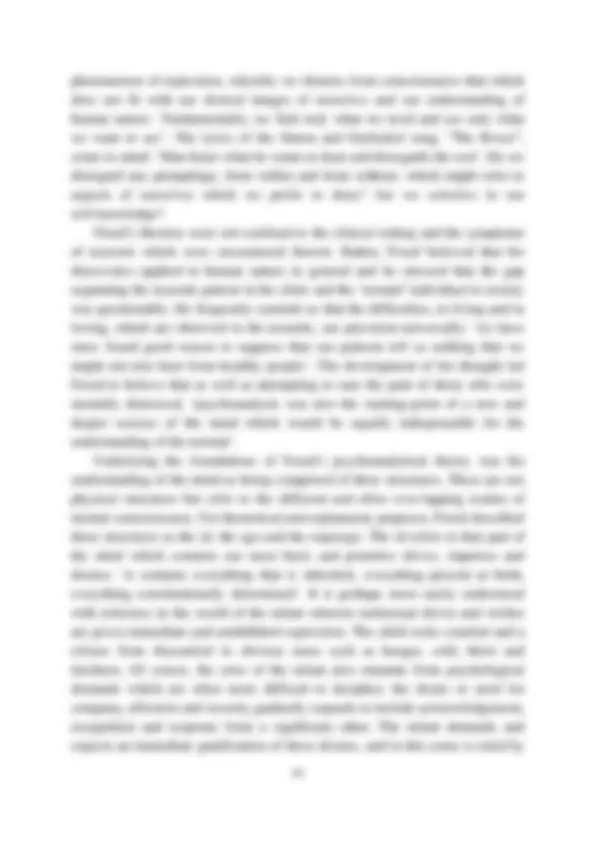
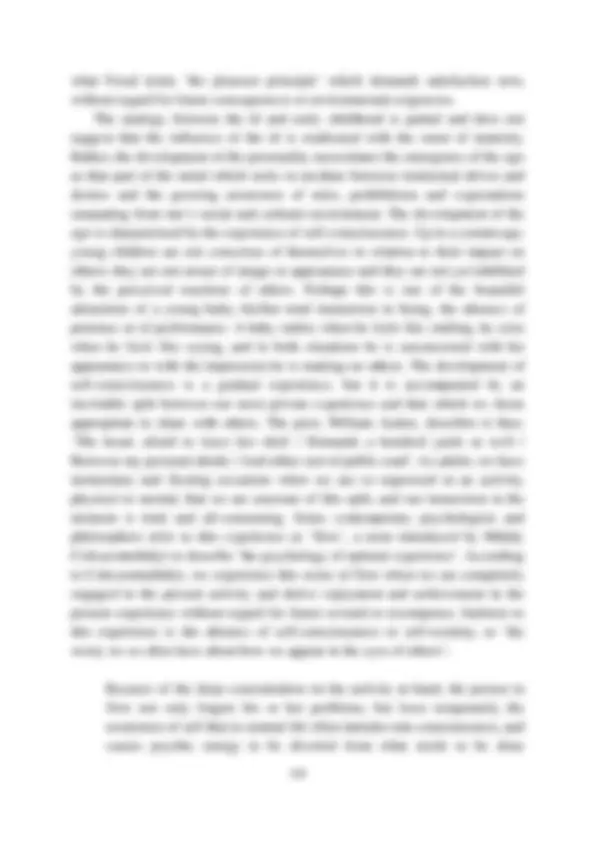
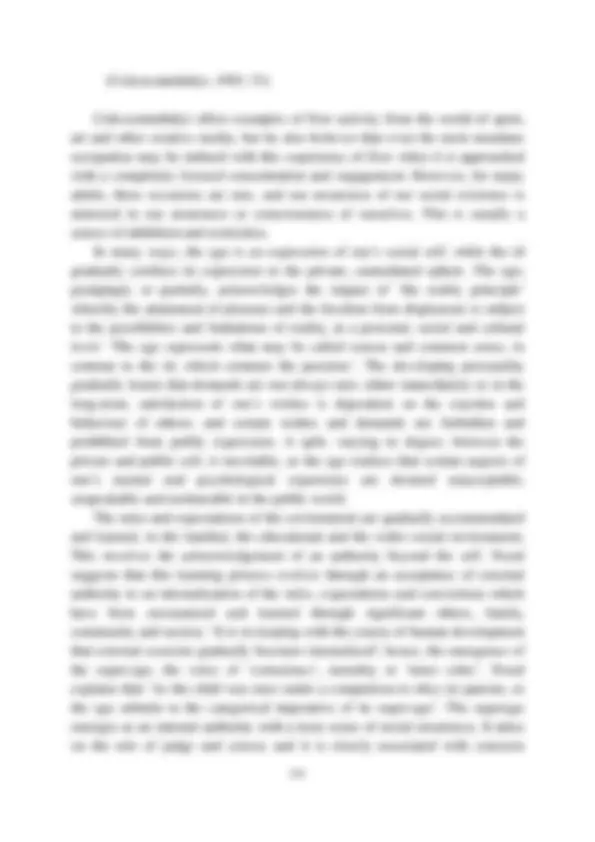
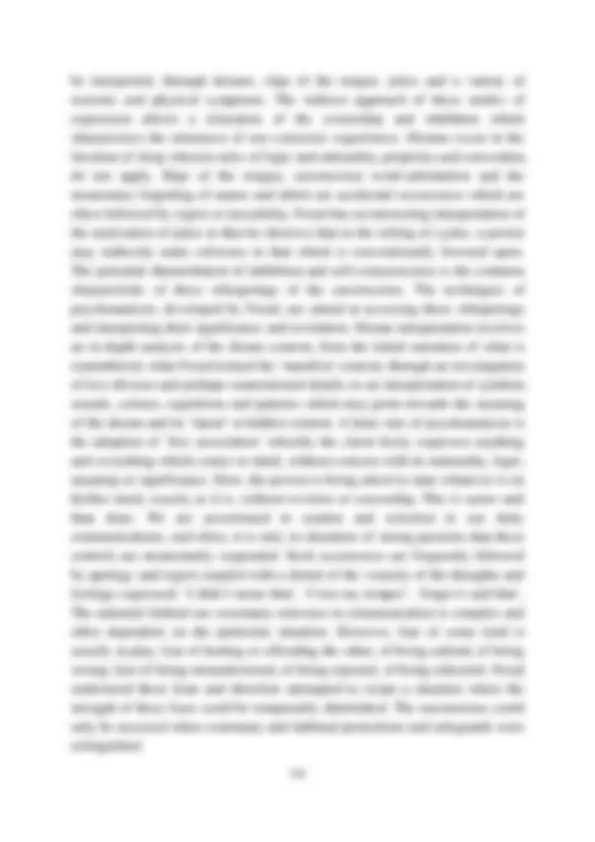
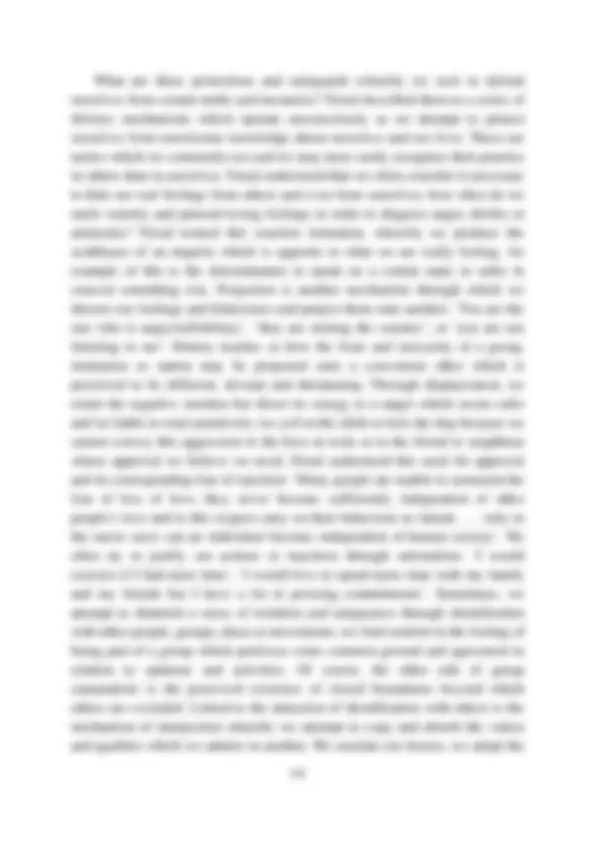
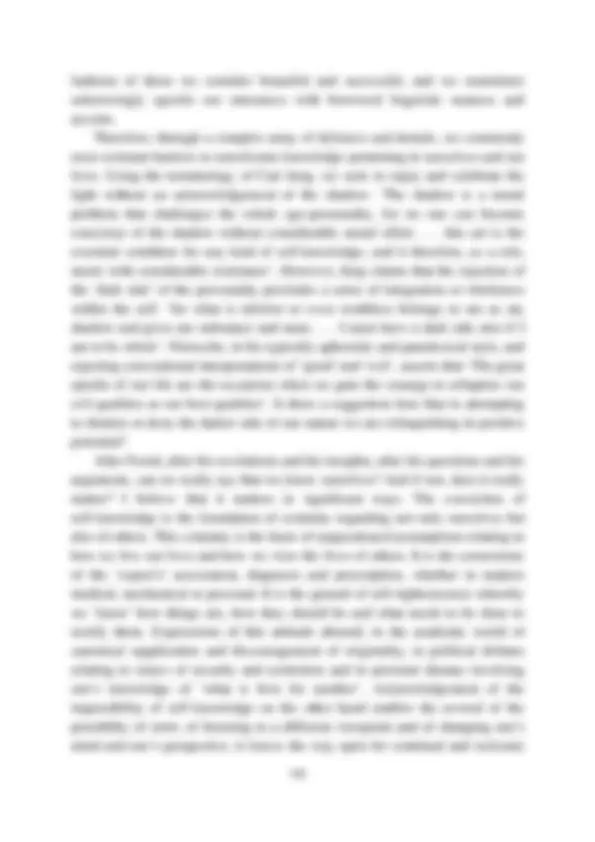


Study with the several resources on Docsity

Earn points by helping other students or get them with a premium plan


Prepare for your exams
Study with the several resources on Docsity

Earn points to download
Earn points by helping other students or get them with a premium plan
Community
Ask the community for help and clear up your study doubts
Discover the best universities in your country according to Docsity users
Free resources
Download our free guides on studying techniques, anxiety management strategies, and thesis advice from Docsity tutors
The theories of Sigmund Freud, John McGahern, and Mihály Csikszentmihályi on human motivation, self-consciousness, and the role of sexuality in behavior. It discusses Freud's emphasis on sexuality, McGahern's portrayal of individual loneliness and frustration, and Csikszentmihályi's concept of 'flow' and self-consciousness. The document also touches upon the development of the personality, the unconscious, and repression.
Typology: Lecture notes
1 / 11

This page cannot be seen from the preview
Don't miss anything!







Journal of Philosophy of Life Vol.3, No.2 (April 2013):97- [Essay]
Abstract Deep down, we believe that we know and understand ourselves better than anyone else can know us. We believe we know what we are thinking, what we are feeling, what we are doing and the reasons for these experiences. We have a vague sense that others may perceive us differently but we conclude that this difference results from the fact that they do not really know us. From birth to death, I am my most constant companion; I am at the centre of all my experiences, at every level. Therefore, surely I know myself! How often do we explain an opinion, a decision or a behaviour by referring to our unquestionable knowledge and understanding of ourselves, who we are, how we are and why we are the way we are? We challenge our audience, listener or friend to support this self-knowledge as we proclaim decisively: ‘You know me, that’s just the way I am’, ‘I’ve always been like this’, or, ‘this is what I always do’. The implication is that if you knew me as well as I know myself, then you would comprehend my behaviour as an inevitable expression of who I am.
The concept of self-knowledge continues to be a subject of debate and reflection in many areas of psychology and philosophy. From the time of the ancient Greeks, the significance of the dictum, ‘Know Thyself’, has penetrated religious and secular philosophies. Yet, frequently, situations arise where we are surprised or puzzled by our own behaviour, confused by our emotional state or unsure of the accuracy of our memory regarding a specific experience. In his essay on the unconscious, Sigmund Freud addressed this phenomenon: ‘In our most personal daily experiences we encounter ideas of unknown origin and the result of thought processes whose working remain hidden from us’. Exclamations, silent or voiced, ensue: ‘I have no idea why I did that!’ ‘I don’t know why I said that!’ ‘I don’t remember!’ ‘I’m not sure how I feel!’ The question emerges: Do we really know ourselves or is our self-knowledge vulnerable to varying degrees of distortion, delusion and deception? Freud was an Austrian psychiatrist who revolutionized traditional approaches to mental illness and its treatment. His development of
psychoanalysis, ‘the talking cure’, was based on the radical idea that mental distress could be understood and alleviated through the development of a therapeutic relationship between the patient and the skilled psychoanalyst. In this relational setting, problems in the present could be understood through an awareness and an understanding of the past, and the patient’s self-knowledge could be enhanced through an honest analysis and timely interpretations on the part of the analyst. Since Freud’s time, many of his theories have fallen out of favour, in particular his insistence on the centrality of sexuality in human motivation and behaviour, not only in adult life, but inherent from the earliest childhood experiences. This reference to childhood sexuality continues to be met with outrage and incredulity; we prefer to imagine the period of childhood as a time of innocence and naivety, and our interpretation of sexuality does not allow it to co-exist with such idealistic images. John McGahern is an Irish novelist who, through his prose and fiction, has poignantly and honestly portrayed the loneliness and frustration experienced by individuals in a society which demands the repression of certain emotional and psychological realities, including the human desire for intimacy, affection and sexual expression. In one of his essays dealing with “Writing and the World”, he repeats the following assertion:
We are sexual from the moment we are born, it grows as the body grows and fails with the body until we die; by then it has become part of the mind and the intelligence and heart, which grows in the human act of becoming as the body fails, and suffuses everything we hold precious or dear (McGahern, 2009: 3).
So, Freud’s theory is not universally dismissed and rejected. It is argued that in positioning sexuality as the dominant motivating force in human behaviour Freud is exaggerating its influence and overlooking other, equally powerful, sources of motivation and direction. How does this argument accommodate the subtle but undeniable selection of sexual undertones and nuances which form the background, or the foreground, of almost every attempt to advertise and sell a vast array of material goods, from soap, cars and homes to holidays, clothes and food? Who can deny the scarcely disguised sexual references permeating the majority of comic scripts and presentations? Freud’s answer to this paradox might lie in his description of the unconscious and in his understanding of the
what Freud terms ‘the pleasure principle’ which demands satisfaction now, without regard for future consequences or environmental exigencies. The analogy between the id and early childhood is partial and does not suggest that the influence of the id is eradicated with the onset of maturity. Rather, the development of the personality necessitates the emergence of the ego as that part of the mind which seeks to mediate between instinctual drives and desires and the growing awareness of rules, prohibitions and expectations emanating from one’s social and cultural environment. The development of the ego is characterized by the experience of self-consciousness. Up to a certain age, young children are not conscious of themselves in relation to their impact on others; they are not aware of image or appearance and they are not yet inhibited by the perceived reactions of others. Perhaps this is one of the beautiful attractions of a young baby; his/her total immersion in being, the absence of pretence or of performance. A baby smiles when he feels like smiling, he cries when he feels like crying, and in both situations he is unconcerned with his appearance or with the impression he is making on others. The development of self-consciousness is a gradual experience, but it is accompanied by an inevitable split between our most private experience and that which we deem appropriate to share with others. The poet, William Auden, describes it thus: ‘The heart, afraid to leave her shell / Demands a hundred yards as well / Between my personal abode / And either sort of public road’. As adults, we have momentary and fleeting occasions when we are so engrossed in an activity, physical or mental, that we are unaware of this split, and our immersion in the moment is total and all-consuming. Some contemporary psychologists and philosophers refer to this experience as ‘flow’, a term introduced by Mihály Csikszentmihályi to describe ‘the psychology of optimal experience’. According to Csikszentmihályi, we experience this sense of flow when we are completely engaged in the present activity and derive enjoyment and achievement in the present experience without regard for future reward or recompense. Intrinsic to this experience is the absence of self-consciousness or self-scrutiny, or ‘the worry we so often have about how we appear in the eyes of others’:
Because of the deep concentration on the activity at hand, the person in flow not only forgets his or her problems, but loses temporarily the awareness of self that in normal life often intrudes into consciousness, and causes psychic energy to be diverted from what needs to be done
(Csikszentmihályi, 1992: 33).
Csikszentmihályi offers examples of flow activity from the world of sport, art and other creative media, but he also believes that even the most mundane occupation may be imbued with this experience of flow when it is approached with a completely focused concentration and engagement. However, for many adults, these occasions are rare, and our awareness of our social existence is mirrored in our awareness or consciousness of ourselves. This is usually a source of inhibition and restriction. In many ways, the ego is an expression of one’s social self, while the id gradually confines its expression to the private, unmediated sphere. The ego, grudgingly or partially, acknowledges the impact of ‘the reality principle’ whereby the attainment of pleasure and the freedom from displeasure is subject to the possibilities and limitations of reality, at a personal, social and cultural level: ‘The ego represents what may be called reason and common sense, in contrast to the id, which contains the passions’. The developing personality gradually learns that demands are not always met, either immediately or in the long-term; satisfaction of one’s wishes is dependent on the reaction and behaviour of others; and certain wishes and demands are forbidden and prohibited from public expression. A split, varying in degree, between the private and public self, is inevitable, as the ego realises that certain aspects of one’s mental and psychological experience are deemed unacceptable, unspeakable and unshareable in the public world. The rules and expectations of the environment are gradually accommodated and learned, in the familial, the educational and the wider social environment. This involves the acknowledgement of an authority beyond the self. Freud suggests that this learning process evolves through an acceptance of external authority to an internalisation of the rules, expectations and convictions which have been encountered and learned through significant others, family, community and society: ‘It is in keeping with the course of human development that external coercion gradually becomes internalized’; hence, the emergence of the super-ego, the voice of ‘conscience’, morality or ‘inner critic’. Freud explains that ‘As the child was once under a compulsion to obey its parents, so the ego submits to the categorical imperative of its super-ego’. The superego emerges as an internal authority with a keen sense of social awareness. It takes on the role of judge and censor, and it is closely associated with concerns
possible to deceive ourselves? – is given at least partial resolution in the inevitable gap between the unconscious dimension of the psyche and its manifest translation in conscious speech. The philosopher, Friedrich Nietzsche sees it as the victory of pride over memory: ‘I have done that’, says my memory. ‘I cannot have done that’ – says my pride, and remains adamant. At last – memory yields’. Freud agrees, stating that ‘there’s no guarantee whatever for what our memory tells us’, and explains the phenomenon from an individual and social perspective: ‘it is inherent in human nature to have an inclination to consider a thing untrue if one does not like it... society makes what is disagreeable into what is untrue’. The stories we tell ourselves about ourselves are not always truthful or comprehensive; the stories we tell to others about ourselves are sometimes coloured by our quest for recognition and approval. In the light of the analyses and insights developed through Freud and Nietzsche, the possibility of complete self-knowledge remains an unattainable ideal; self-deception is a phenomenon which must be acknowledged. Freud considered that repression was a universal phenomenon, and that in most cases it did not lead to mental or emotional difficulties. However, he also believed that what was repressed was never fully forgotten or eradicated, but continued to exert an influence on our motivation and behaviour. This is the phenomenon of ‘the return of the repressed’ whereby unconscious memories are acted out rather than directly recalled. One of the most obvious signs of this influence is ‘the compulsion to repeat’, the inexplicable repetition of patterns of behaviour which experience shows to be detrimental to our well-being and happiness. Many of our actions adhere to this interpretation; many of our relationships repeat the traumas and disappointments of earlier encounters; many of our hopes and ambitions have their origins in past attempts to satisfy our needs. Thus, we do not always understand what lies behind our behaviour or towards what aim it is directed. We do not always know ourselves. Our behaviour, our words, our feelings, our dreams and wishes are often a mystery to us, apparently lacking any basis in logical reasoning. A primary aim of Freud’s psychoanalytic theory is to bring elements of the unconscious to conscious awareness. The unconscious seeks and attains expression through a variety of modes which are not governed by the logic or accessibility of conscious thought or behaviour: ‘The decisive rules of logic don’t apply in the unconscious; we could call it the Empire of the Illogical’. According to Freud, the contents of the unconscious reveal themselves, and may
be interpreted, through dreams, slips of the tongue, jokes and a variety of neurotic and physical symptoms. The indirect approach of these modes of expression allows a relaxation of the censorship and inhibition which characterizes the utterances of our conscious experiences. Dreams occur in the freedom of sleep wherein rules of logic and rationality, propriety and convention, do not apply. Slips of the tongue, unconscious word-substitution and the momentary forgetting of names and labels are accidental occurrences which are often followed by regret or incredulity. Freud has an interesting interpretation of the motivation of jokes in that he observes that in the telling of a joke, a person may indirectly make reference to that which is conventionally frowned upon. The potential diminishment of inhibition and self-consciousness is the common characteristic of these whisperings of the unconscious. The techniques of psychoanalysis, developed by Freud, are aimed at accessing these whisperings and interpreting their significance and revelation. Dream interpretation involves an in-depth analysis of the dream content, from the initial narration of what is remembered, what Freud termed the ‘manifest’ content, through an investigation of less obvious and perhaps unmentioned details, to an interpretation of symbols, sounds, colours, repetitions and patterns which may point towards the meaning of the dream and its ‘latent’ or hidden content. A basic rule of psychoanalysis is the adoption of ‘free association’ whereby the client freely expresses anything and everything which comes to mind, without concern with its rationality, logic, meaning or significance. Here, the person is being asked to state whatever is on his/her mind, exactly as it is, without revision or censorship. This is easier said than done. We are accustomed to caution and selection in our daily communications, and often, it is only in situations of strong passions that these controls are momentarily suspended. Such occurrences are frequently followed by apology and regret coupled with a denial of the veracity of the thoughts and feelings expressed: ‘I didn’t mean that’, ‘I lost my temper’, ‘forget I said that’. The rationale behind our customary reticence in communication is complex and often dependent on the particular situation. However, fear of some kind is usually at play; fear of hurting or offending the other, of being unkind, of being wrong; fear of being misunderstood, of being rejected, of being ridiculed. Freud understood these fears and therefore attempted to create a situation where the strength of these fears could be temporarily diminished. The unconscious could only be accessed when customary and habitual protections and safeguards were relinquished.
fashions of those we consider beautiful and successful, and we sometimes unknowingly speckle our utterances with borrowed linguistic nuances and accents. Therefore, through a complex array of defences and denials, we commonly erect resistant barriers to unwelcome knowledge pertaining to ourselves and our lives. Using the terminology of Carl Jung, we seek to enjoy and celebrate the light without an acknowledgement of the shadow: ‘The shadow is a moral problem that challenges the whole ego-personality, for no one can become conscious of the shadow without considerable moral effort... this act is the essential condition for any kind of self-knowledge, and it therefore, as a rule, meets with considerable resistance’. However, Jung claims that the rejection of the ‘dark side’ of the personality precludes a sense of integration or wholeness within the self: ‘for what is inferior or even worthless belongs to me as my shadow and gives me substance and mass... I must have a dark side also if I am to be whole’. Nietzsche, in his typically aphoristic and paradoxical style, and rejecting conventional interpretations of ‘good’ and ‘evil’, asserts that ‘The great epochs of our life are the occasions when we gain the courage to rebaptize our evil qualities as our best qualities’. Is there a suggestion here that in attempting to dismiss or deny the darker side of our nature we are relinquishing its positive potential? After Freud, after his revelations and his insights, after his questions and his arguments, can we really say that we know ourselves? And if not, does it really matter? I believe that it matters in significant ways. The conviction of self-knowledge is the foundation of certainty regarding not only ourselves but also of others. This certainty is the basis of unquestioned assumptions relating to how we live our lives and how we view the lives of others. It is the cornerstone of the ‘expert’s’ assessment, diagnosis and prescription, whether in matters medical, mechanical or personal. It is the ground of self-righteousness whereby we ‘know’ how things are, how they should be and what needs to be done to rectify them. Expressions of this attitude abound, in the academic world of canonical supplication and discouragement of originality, in political debates relating to issues of security and restriction and in personal dramas involving one’s knowledge of ‘what is best for another’. Acknowledgement of the impossibility of self-knowledge on the other hand enables the avowal of the possibility of error, of listening to a different viewpoint and of changing one’s mind and one’s perspective; it leaves the way open for continual and welcome
change as new information and new experiences are encountered; and it co-exists with a healthy humility whereby we realize that our possession of knowledge is always experienced through a subjective and fallible lens and is therefore always incomplete and impermanent. Herein lies the gateway to wisdom, tolerance and peaceful co-existence! Auden poetically captures our debt to Freud in this regard:
If often he was wrong and, at times, absurd, to us he is no more a person now but a whole climate of opinion under whom we conduct our different lives … The proud can still be proud but find it A little harder (Auden, 1997: 275).
Bibliography
Auden, W.H., 1994. Collected Poems. London: Faber and Faber. Csikszentmihályi, Mihaly, 1992. Optimal Experience: Psychological Studies of Flow in Consciousness. Cambridge: Cambridge University Press. Freud, Sigmund, 1995. The Freud Reader. ed. Peter Gay. New York: W.W. Norton & Company. Freud, Sigmund, 1997. The Interpretation of Dreams. Translated by A.A. Brill. Herfordshire: Wordsworth Editions Limited. Freud, Sigmund, 2002. Civilization and Its Discontents. Translated by David McLintock. London: Penguin Classics. Freud, Sigmund, 2005. The Unconscious. London: Penguin Classics. Freud, Sigmund, 2006. The Penguin Freud Reader. ed. Adam Phillips. London: Penguin. Jung, Carl, 1998. The Essential Jung. London: Fontana Press. Jung, Carl, 2004. Modern Man in Search of a Soul. London: Routledge Classics. McGahern, John, 2009. Love of the World. London: Faber and Faber. Nietzsche, Friedrich, 2003. Beyond Good and Evil. Translated by R. J. Hollingdale. London: Penguin Books. Simon, Paul, 1996. Simon & Garfunkel’s Greatest Hits. New York: Music Sales Corporation.